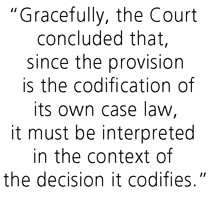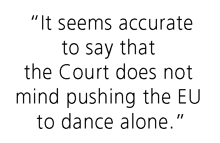 “With the decision in case C-114/12, the Court is now placing emphasis on the hypotheticals by holding that the mere possibility of an international agreement impacting the EU acquis is enough to rule out Member States’ intervention, making the EU exclusively competent to conclude this type of agreement.”
“With the decision in case C-114/12, the Court is now placing emphasis on the hypotheticals by holding that the mere possibility of an international agreement impacting the EU acquis is enough to rule out Member States’ intervention, making the EU exclusively competent to conclude this type of agreement.”
On 4 September 2014, the Court of Justice of the EU (CJEU) delivered its ruling in case C-114/12 – Commission and Parliament v. Council, concerning a decision of the Council and the Representatives of the Governments of the Member States. The decision authorized the Commission to participate in the negotiation for a Convention on the protection of the rights of broadcasting organizations as regards matters falling within EU’s competence.
However, the decision also made clear that, where the negotiations concerned issues falling under Member States’ competence, the Council ought to participate in the negotiations, and conduct them on behalf of the Member States (or, where an agreed common position could not be reached, the Member States ought to participate independently). The Commission sought the annulment of the decision, one of its arguments being that the EU competence on the matter was exclusive.
The Commission did not claim exclusive competence under Articles 3(1)(e) and 207 of the Treaty on the Functioning of the European Union (TFEU), according to which the EU is exclusively competent to negotiate and conclude international agreements on the commercial aspects of IP (these provisions could be used as legal bases for TRIPS look-alike Treaties, as per the Court’s decision in Daiichi).
 Instead, the Commission based its reasoning on Article 3(2) TFEU, which confers upon the EU the exclusive competence to conclude an international agreement when, among other things, its conclusion may affect common EU rules or alter their scope. As the Court pointed out, this specific part of the provision is the codification of the Court’s case law (the so-called ERTA doctrine), which could make this case an interesting example of judicial cannibalism (at the end of the day, the Court is interpreting its own previous interpretation in an earlier case). Gracefully, the Court concluded that, since the provision is the codification of its own case law, it must be interpreted in the context of the decision it codifies (phew!).
Instead, the Commission based its reasoning on Article 3(2) TFEU, which confers upon the EU the exclusive competence to conclude an international agreement when, among other things, its conclusion may affect common EU rules or alter their scope. As the Court pointed out, this specific part of the provision is the codification of the Court’s case law (the so-called ERTA doctrine), which could make this case an interesting example of judicial cannibalism (at the end of the day, the Court is interpreting its own previous interpretation in an earlier case). Gracefully, the Court concluded that, since the provision is the codification of its own case law, it must be interpreted in the context of the decision it codifies (phew!).
Referring back to the ERTA doctrine, the Court stated that, in order for an international agreement to come under the EU’s exclusive competence as established in Article 3(2) TFEU, it was necessary to perform a “specific analysis of the relationship between the envisaged international agreement and the EU law in force” (see paragraph 74 of the decision). According to the Court, the EU would have exclusive competence to negotiate the Convention if it would be clear from said analysis that the Convention was capable of affecting EU common rules or altering their scope.
Lest we forget, one of the rationales of the ERTA doctrine was exactly the need to have a parallelism between internal EU legislation and the conclusion of international agreements, with a view to ensuring the unity of the internal market and the uniform application of EU law (see paragraph 31 of the ERTA decision). If the IP acquis and the matters to be negotiated in the Convention overlap (even if not fully, as clarified in paragraphs 69-70 of the decision in case C-114/12), then the EU ought to be solely competent to enter into the Convention, so as to guarantee coherence between it and existing EU legislation.
The area concerned in this case was, the Court concluded, the protection of neighbouring rights of broadcasters (hardly surprising, considering the very name of the Convention…). The elements of the negotiation that fall under the EU’s competence and the ones that come under Member States’ competence are not identified. The parties to the dispute agreed that certain elements of the negotiation – such as the rights of fixation, reproduction, making available to the public and distribution – are already covered by the EU acquis. However, they disagreed with regard to other issues that might be considered in the context of the Convention, namely the rights of retransmission and communication to the public, the protection of pre-broadcast signals and the enforcement of neighbouring rights of broadcasters.
The Court sided with the Commission in its findings that some of these elements are indeed covered by the acquis. This was the case, for instance, of the right of retransmission, which the Court considered to be partially covered by EU rules. Therefore, the competence in relation to those elements would exclusively belong to the EU, since any international agreement regulating them would have an impact on the acquis.
Other elements however could either be covered or not by the acquis depending on the outcome of negotiations. For example, the protection of pre-broadcast signals – currently non-existent in EU law – could be attained by extending the scope of the term “broadcasts” to pre-broadcasts signals, in which case said signals would be part of the rights of broadcasters. This would expand (read: alter) the scope of common EU rules on the subject (and grant the EU exclusive competence to enter into an international agreement on such terms). Yet, the protection of pre-broadcast signals could also be achieved, e.g., through the introduction of a new sui generis right, in which case the exclusive competence could not be granted under Article 3(2) TFEU. In other words, some of the possible regulatory approaches to pre-broadcast signals would entail an exclusive competence of the EU, while others would not.
 Confronted with this scenario of uncertainty, the Court dismissed the latter option as being “hypothetical” (as opposed to the former option, might a cynical reader ask?…). It thus seems that the chance that one of the outcomes of negotiations might impact the EU acquis is enough to consider the EU exclusively competent (even on those matters whose regulatory approach in the future agreement is unknown).
Confronted with this scenario of uncertainty, the Court dismissed the latter option as being “hypothetical” (as opposed to the former option, might a cynical reader ask?…). It thus seems that the chance that one of the outcomes of negotiations might impact the EU acquis is enough to consider the EU exclusively competent (even on those matters whose regulatory approach in the future agreement is unknown).
To be fair, the Court justified its choice with the lack of evidence provided by the Council and the intervening Member States. And one can say that the wording of Article 3(2) TFEU – may affect common rules or alter their scope – suggests that a mere possibility is enough to trigger an exclusive competence of the EU. However, if this judgment is read together with the one in the Daiichi case (on which see previous blog post here), it can be argued that , in matters of external competence, a principle of in dubio pro EU seems to be the Court’s preferred approach.
Following the Daiichi case, the exclusive competence of the EU to negotiate and conclude international agreements covering the commercial aspects of IP might include powers to conclude agreements that carry out an international harmonization of IP standards (such as TRIPS) – a significantly low threshold to assess competence, given that in principle most international IP-related agreements will carry out some form of harmonization of IP standards.
With the decision in case C-114/12, the Court is now placing emphasis on the hypotheticals by holding that the mere possibility of an international agreement impacting the EU acquis is enough to rule out Member States’ intervention, making the EU exclusively competent to conclude this type of agreement. The ever-growing IP acquis, grouped with the patchwork harmonization in some areas (such as copyright), make it hard to imagine one IP agreement that would not be somehow linked or overlapping with existing IP legislation, thereby setting off the EU’s exclusive competence. In matters of external competence of the EU in IP, it seems accurate to say that the Court does not mind pushing the EU to dance alone.
AR
________________________
To make sure you do not miss out on regular updates from the Kluwer Copyright Blog, please subscribe here.


